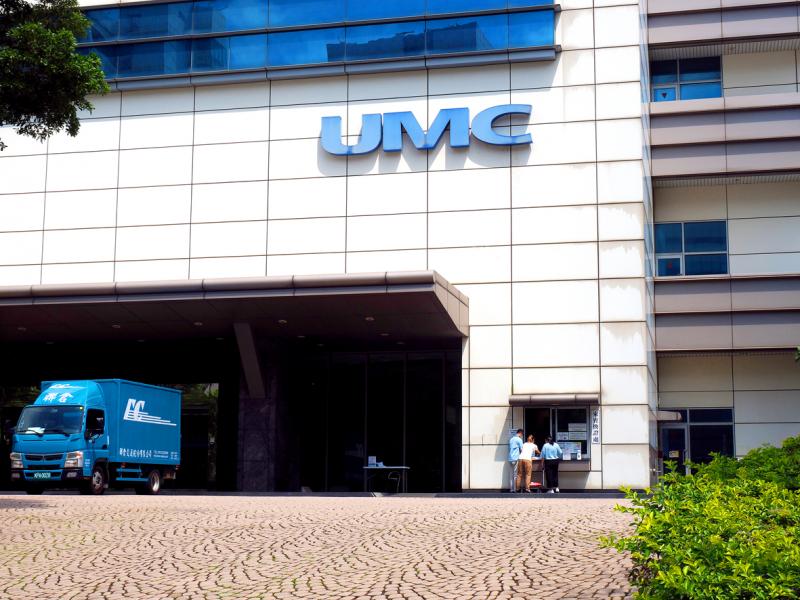United Microelectronics Co (UMC, 聯電) is expected to overtake GlobalFoundries Inc as the world’s third-largest foundry this quarter, as strong demand for display driver and power management chips is estimated to help drive its revenue up 13 percent, market researcher TrendForce Corp (集邦科技) said yesterday.
UMC would see its revenue expand to US$1.57 billion this quarter from a year earlier, with a global market share of 6.9 percent, compared with GlobalFoundries’ estimated revenue of US$1.49 billion, with a market share of 6.6 percent, the Taipei-based researcher said.
TrendForce attributed the growth to rising customer orders for display driver, power management and Internet of Things chips.

Photo: David Chang, EPA-EFE
That would boost the utilization rate at UMC’s 8-inch factories and its chip prices, as well as its shipments of 28-nanometer chips, TrendForce said.
GlobalFoundries is streamlining its factory operations, after selling an 8-inch fab in Singapore to Taiwan’s Vanguard International Semiconductor Corp (世界先進) at the end of last year for US$236 million.
Taiwan Semiconductor Manufacturing Co (台積電) is expected to retain its top position, with revenue forecast to surge 21 percent year-on-year to US$12.55 billion this quarter and a market share of 55.6 percent.
Samsung Electronics Co would rank fourth, with revenue likely to expand 16.4 percent to US$3.72 billion and a 16.4 percent market share, TrendForce said.
Semiconductor Manufacturing International Corp (SMIC, 中芯國際), the biggest chipmaker in China, would rank fifth, with a market share of 4.3 percent, as its revenue is predicted to grow 15 percent to US$963 million this quarter, benefiting from rising demand for radio frequency and power management chips, TrendForce said.
However, SMIC’s revenue this quarter would decline 11 percent quarter-on-quarter, as it was forced to stop shipping chips to HiSilicon Technologies Co (海思), the chip designing arm of Huawei Technologies Co (華為), from Sept. 14.
SMIC was also added to a US blacklist due to its ties with the Chinese military.
Tower Semiconductor Ltd, which sells chips under the Tower Jazz brand, seized the sixth spot with revenue of US$340 million, up 11 percent from a year earlier. The Israeli company is expected to have a market share of 1.5 percent this quarter.
Taiwan’s Powerchip Semiconductor Manufacturing Co (力積電) and Vanguard ranked seventh and eighth, with revenue growing 28 percent and 24 percent to US$312 million and US$297 million respectively this quarter, TrendForce said.
The two firms would have market shares of 1.4 percent and 1.3 percent respectively, it said.

Leading Taiwanese bicycle brands Giant Manufacturing Co (巨大機械) and Merida Industry Co (美利達工業) on Sunday said that they have adopted measures to mitigate the impact of the tariff policies of US President Donald Trump’s administration. The US announced at the beginning of this month that it would impose a 20 percent tariff on imported goods made in Taiwan, effective on Thursday last week. The tariff would be added to other pre-existing most-favored-nation duties and industry-specific trade remedy levy, which would bring the overall tariff on Taiwan-made bicycles to between 25.5 percent and 31 percent. However, Giant did not seem too perturbed by the

Foxconn Technology Co (鴻準精密), a metal casing supplier owned by Hon Hai Precision Industry Co (鴻海精密), yesterday announced plans to invest US$1 billion in the US over the next decade as part of its business transformation strategy. The Apple Inc supplier said in a statement that its board approved the investment on Thursday, as part of a transformation strategy focused on precision mold development, smart manufacturing, robotics and advanced automation. The strategy would have a strong emphasis on artificial intelligence (AI), the company added. The company said it aims to build a flexible, intelligent production ecosystem to boost competitiveness and sustainability. Foxconn

TARIFF CONCERNS: Semiconductor suppliers are tempering expectations for the traditionally strong third quarter, citing US tariff uncertainty and a stronger NT dollar Several Taiwanese semiconductor suppliers are taking a cautious view of the third quarter — typically a peak season for the industry — citing uncertainty over US tariffs and the stronger New Taiwan dollar. Smartphone chip designer MediaTek Inc (聯發科技) said that customers accelerated orders in the first half of the year to avoid potential tariffs threatened by US President Donald Trump’s administration. As a result, it anticipates weaker-than-usual peak-season demand in the third quarter. The US tariff plan, announced on April 2, initially proposed a 32 percent duty on Taiwanese goods. Its implementation was postponed by 90 days to July 9, then

AI SERVER DEMAND: ‘Overall industry demand continues to outpace supply and we are expanding capacity to meet it,’ the company’s chief executive officer said Hon Hai Precision Industry Co (鴻海精密) yesterday reported that net profit last quarter rose 27 percent from the same quarter last year on the back of demand for cloud services and high-performance computing products. Net profit surged to NT$44.36 billion (US$1.48 billion) from NT$35.04 billion a year earlier. On a quarterly basis, net profit grew 5 percent from NT$42.1 billion. Earnings per share expanded to NT$3.19 from NT$2.53 a year earlier and NT$3.03 in the first quarter. However, a sharp appreciation of the New Taiwan dollar since early May has weighed on the company’s performance, Hon Hai chief financial officer David Huang (黃德才)